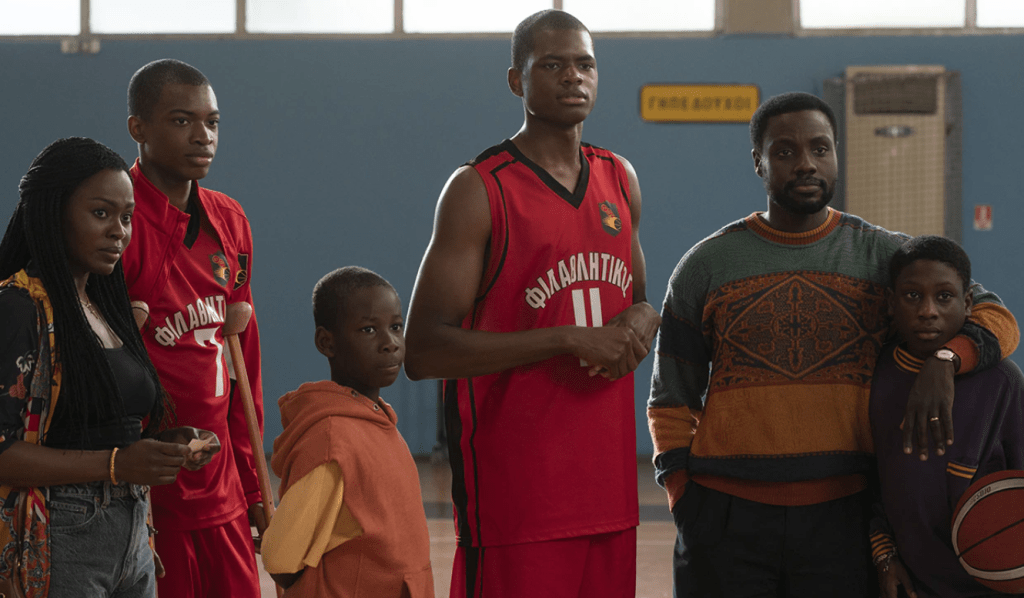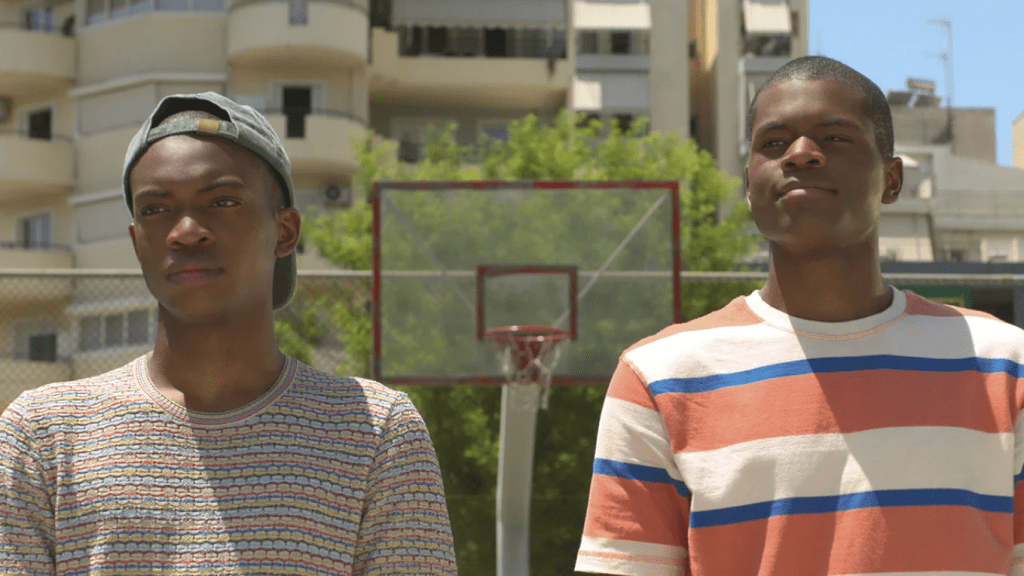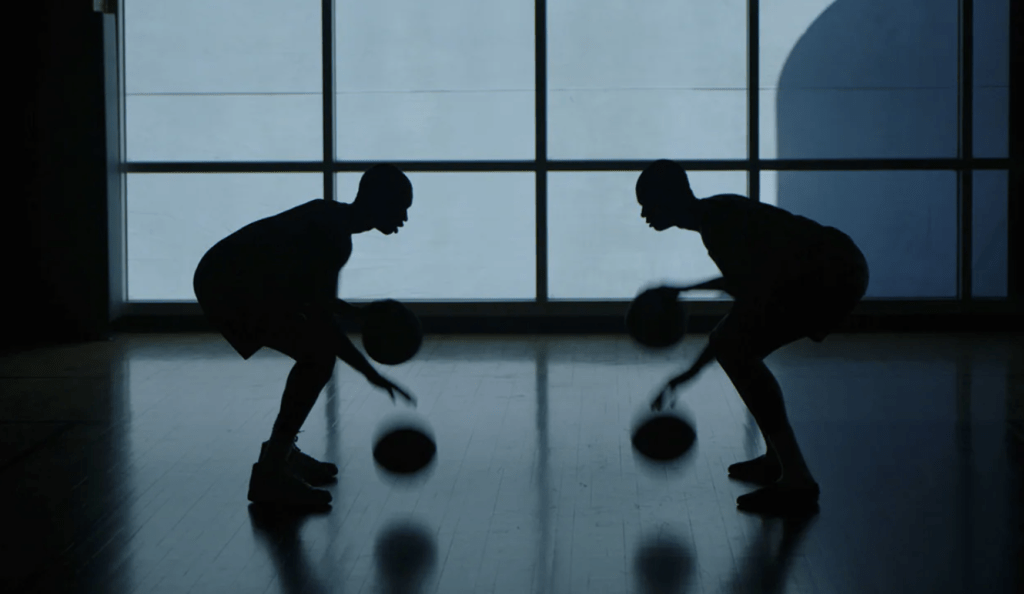In Rise, Akin Omotoso shows the world a side of Nigeria not so often portrayed in the popular, soulless, franchise Nollywood of touted mediocrity. Yet, it appears that at times, the film becomes unduly cosmetic in order fulfil a Cinderella archetype.
Rise, Akin Omotoso’s Disney-produced biopic about the Milwaukee Bucks’ NBA champion, Giannis Antetokounmpo, follows the story of the Greek-Nigerian. Relying heavily on subtext, Omotoso displays careful attention to small details, a prominent feature throughout the movie. The prologue is made up of a series of short flashbacks, reminiscent of VHS-like footage, with the hummed tune of Christy Essien-Igbokwe’s ‘Seun Rere’ as the backing track.
In Essien-Igbokwe’s ‘Seun Rere’ (the soundtrack woven into the philosophical arc of the movie), a mother urges her child to listen to her and goodness shall be his lot, after which the child responds, ‘Ìyá mi, má ṣeun réré, gbàdú rà fún mi’ (‘My mother, I shall tread the holy path, do pray for me’). Veronika Antetokounmpo—played by the endearing and camera-friendly Yetide Badaki—sings this second part when she’s on the bus returning from the hospital and carries the new-born Giannis in her arms. The beauty of this song arguably strikes a parallel to the lives of the Antetokounmpos. Veronika is a praying mother always interceding for her children whose faith in their mother is unwavering.

Yetide Badaki as Vera, Ral Agada as Thanasis, Elijah Sholanke as Alexandros, Uche Agada as Giannis, Dayo Okeniyi as Charles, and Jaden Osimuwa as Kostas in RISE, exclusively on Disney+. Photo by Patrick Redmond.
PURSUIT OF HAPPINESS
Three flashbacks scenes begin the film: the first takes the viewer to ‘Lagos, Nigeria 1990’, where a young Veronika wears a buba as she cradles and kisses a baby she will soon leave in the care of her mother, to travel across the sea. In the second flashback, she passes the baby to her mother (Joke Silva), saying the words, ‘Please, take care of him.’ The third flashback is a frame-within-a-frame shot: the departing parents in a Peugeot 504 saloon, a tearful Veronika, and a mournful Charles Antetokounmpo (Dayo Okeniyi), looking back through the Peugeot’s rear windshield at Veronika’s mother carrying the infant they’ve left behind. This last scene fades as the car moves out of the compound, increasing the distance between the departing parents and the child and accompanied by the refrain from ‘Seun Rere’, ‘Ọmọ mi, ṣeun rere, tiẹ̀ a dára ó…’ (‘My child, tread the holy path and goodness shall be your lot).
A night-time aerial view of ‘Istanbul, Turkey 1991’ fills the screen. A year on from the Antetokounmpos’ departure from Lagos, the camera view descends into a corner shop. The scenic postcard view is juxtaposed with the goings-on in the scene—a clampdown on illegal immigrants. Charles and a now-pregnant Veronika are in a run-down hostel trying to evade capture by Turkish immigration officers. The next morning, however, the couple manages to make it to a bus station and successfully crosses the border into Greece.
A GRECIAN LIFE
Greece is a fine country, even ‘90s Greece, as we see through Omotoso’s camera. He is deliberate when he shows us a scenic aerial shot of Athens’ Acropolis ruins, and a cut of the famous clear, turquoise-coloured lake of the Limanakia seaside, amongst other picturesque shots. This is the country with an egalitarian history that immigrants like the Antetokounmpos arrive at seeking a better life.
Charles works different odd jobs, whilst Veronika sells petty merchandize. The movie soon fast-forwards to 2004, at which time the Antetokounmpos have four sons whose vitality animates the screen: they run in the streets, the older two, Thanasis (Ral Agada) and Giannis (Uche Agada), peddle various wares at the promenade, play video games at home and play football and other sporting activities. Several years on, Thanasis and Giannis are on a streetside basketball court playing with a number of Greek boys who, after the game, invite them to their Free Youth Club at Filathlitikos for basketball training.
Playing the Antetokounmpo couple, the actors Badaki and Okeniyi effuse an infectious on-screen romance, matched by the contagious geniality of the actors playing the children. This chemistry makes it feel like we have stopped watching a movie, but are watching, instead, the lives of a small, unknown, yet sentimentally significant Nigerian family so far away from home and existing as a microcosm of the Nigerian familial structure in the vast geographical indifference of Greece. And it is Omotoso’s job to unravel their experience, their intimacies, their pain and triumphs, their ultimate existence, to his viewers; what a few hours of film can only give us a glimpse of, but which Omotoso manages to enrich our experience of.

Ral Agada as Thanasis and Uche Agada as Giannis in Disney’s live-action RISE, exclusively on Disney+ / Disney Enterprises, Inc.
AN ENRICHED PORTRAYAL OF THE IMMIGRANT EXPERIENCE
What we gain from this enrichment is a lesson about family; the inspirational journey of the Antetokounmpos. So tender about this portrayal, Omotoso shot each family scene—accounting for nearly all scenes in the movie—with deliberateness and enthusiasm, so much so that he turns the Antetokounmpos’ household into a shrine of familial refuge. This is due to Omotoso’s ability to relate to Giannis’ story on a very personal level: Omotoso’s grandparents having left Barbados for London, and his parents having migrated from Nigeria to South Africa.
Pursuing this authenticity of the Antetokounmpo family on screen, Omotoso explains, on Trevor Noah’s The Daily Show, was very important to him. Thus, in making Rise, the family was involved in every process, and ‘every meeting with them,’ he says, ‘is a family meeting. It’s Giannis, it’s Veronika, it’s Thanasis, Kosta and Alex, Producer Bernie Goldmann and all the folks from Disney; we all gather around to discuss the film like it’s a family affair.’ And in reciprocating the family’s generosity, he was committed to getting the film right. ‘For me, I wanted to get it right,’ he says. His commitment is palpable in every scene, going further to shoot a huge part of the movie in the actual locations in Greece, like the basketball court Giannis once trained on.
For the NBA star who co-produced the film, Omotoso says Giannis ‘wanted to make sure that the sacrifices of his mum and dad came through,’ and that the movie ‘is a love letter to his parents.’ But in playing the role of director, Omotoso makes Rise a love letter to Nigeria as well. In the scene of Giannis’s naming ceremony, for example, Omotoso shows the world a side of Nigeria not so often portrayed in the popular, soulless, franchise Nollywood of touted mediocrity. Yet, it appears that in his painstaking commitment to depict his vision of authenticity, and his hyperfocus on the Antetokounmpo family, the film becomes unduly cosmetic in order fulfil a Cinderella archetype.
For example, we don’t feel much threat on the undocumented immigrant lives of the family, neither do we feel convinced of their luck. Few are the scenarios that show any of this, like when Veronika, heavily pregnant and about to go into labour, meets a Greek soldier on the bus. Where we might expect a confrontation, the soldier rises and gives her his seat. Similarly, when Giannis and Thanasis are riding a bus and witness a crowd protesting for immigrants to leave their country, the crowd appears passive.
However, an exception appears in one sharp, visceral moment: tired of the Kafkaesque process at the office where he has been trying, for years, to secure legal residency, Charles confronts the Greek official: ‘Ms Pantazis,’ he says, ‘did you know that Greek civilization has its roots in Africa? . . . Zeus, and Sango, the Yoruba god of lightning and thunder, they’re the same.’ It is an effective scene Omotoso uses to highlight the racial undertones of the Antetokounmpos’ immigrant experience.

Ral Agada as Thanasis and Uche Agada as Giannis in Disney’s live-action RISE, exclusively on Disney+. Photo courtesy of Disney Enterprises, Inc.
THE CLARITY OF DREAMS
In a very moving scene, possibly the movie’s pièce de résistance, the camera closes up to Charles’ workman’s hands where the family has gone to watch Giannis at the FIBA (International Basketball Federation) Regional Tryouts, to progress to the NBA draft. Unable to sit and watch Giannis’s uncertain outcome, Charles goes to wait outside, anxious. The scene is incredibly imagined: Charles’ smallness is apparent—a lonely Black man, a stranger who has come a long way from home in search of a better life, but who has remained a struggling father. He paces, forlorn, beside the colossal architecture of the stadium, reflecting, perhaps, on his failure of becoming a successful footballer as his son now finds his own path, wishing the outcome is different this time.
In a world intent on threatening conservative values, Rise is a reassuring reminder of the importance of family, of the strength and love we can find within its structure. More importantly, as portrayed by the lives of the Antetokounmpos, this isn’t just any ordinary family, but a strong, genuine Christian family; the type of family popular in 1980s and ’90s Nigeria, held together by a hardworking father, a prayerful mother, and each family member looking out for one another; but which today is disappearing as a result of the country’s many woes, the Nigerian church weakened, succumbing to the temptations it sets out to resist.
For many immigrants, there’s so much relief in the legitimacy brought about by a stamped passport. This is shown in one of the more memorable scenes when the brother Giannis and Thanasis, along with the charming NBA scout Harris (Jake Schwencke), try to get a consular staff at the US embassy in Greece to stamp the boys’ passports for the NBA draft in New York. The light-hearted and celebrative moment is what the remainder of the movie arrives at. It builds up to the 2013 NBA Draft, an anxious moment similar to one of the closing scenes in Denzel Washington’s The Great Debaters when the southern Wiley College debates Harvard University and waits for the judges’ result. But as if all hope’s lost, on the last slot of NBA draft, the Milwaukee Bucks announce Giannis as their chosen player.
Navigating the struggles of the immigrant experience is aptly summarized in an earlier scene: Charles returns from work only to receive the surprise welcome of the birth of his second child, Giannis, and Veronika says to him: ‘You only have to think about what’s in front of you.’ And rise to it, perhaps⎈
The views, thoughts, and opinions published in The Republic belong solely to the author and are not necessarily the views of The Republic or its editors. We want to hear what you think about this article. Submit a letter to the editors by writing to [email protected].


